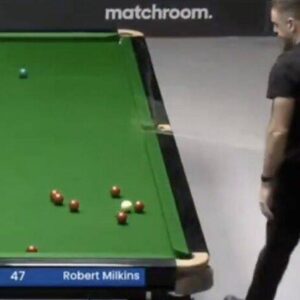
“Debate Over Snooker’s Olympic Future: Ronnie O’Sullivan and Steve Davis Offer Conflicting Views on the Sport’s Place in the Games”…
The debate over whether snooker should be included in the Olympic Games has sparked passionate opinions from players, fans, and commentators alike.
This conversation gained further traction as two of the sport’s legends, Ronnie O’Sullivan and Steve Davis, voiced contrasting views on the topic.
While snooker has a rich history and a devoted global following, its place in the world’s biggest sporting event remains uncertain.
The Case for Snooker in the Olympics
Proponents argue that snooker meets several criteria for Olympic inclusion. It is a global sport with millions of players and fans, especially in regions like the UK, China, and Southeast Asia.
With its precision, skill, and mental fortitude, snooker shares similarities with other Olympic sports that require strategy and concentration, such as archery, shooting, or even chess, which has also campaigned for Olympic recognition.
Steve Davis, a six-time World Champion and a vocal supporter of snooker’s Olympic bid, believes the sport’s inclusion could elevate its status and attract a new audience.
Davis has pointed out that snooker’s global appeal has grown exponentially, particularly in countries like China, where players such as Ding Junhui have become national icons. Including snooker in the Olympics could further solidify its status as an internationally respected sport.
Additionally, the introduction of snooker to the Olympics could inspire a younger generation of players and increase participation at grassroots levels.
Much like table tennis saw a surge in popularity after its inclusion in the 1988 Olympics, snooker could experience similar growth, creating a new wave of talent and fans worldwide.
The Case Against Snooker in the Olympics
On the other hand, Ronnie O’Sullivan, widely regarded as one of the greatest snooker players of all time, has expressed skepticism about snooker’s place in the Olympics.
O’Sullivan’s reservations stem from a belief that snooker, while a challenging and highly skilled game, may lack the physicality typically associated with Olympic sports.
He has also questioned whether the format of snooker tournaments could be condensed to fit the fast-paced schedule of the Olympics without compromising the integrity of the game.
Another point of contention is whether the Olympics would genuinely benefit the sport. O’Sullivan has argued that snooker’s prestige lies in its long-established tournaments, such as the World Championship and the Masters, which already command significant attention.
He fears that Olympic inclusion might dilute snooker’s identity by forcing it to adapt to a format that prioritizes accessibility over tradition.
Moreover, critics of the Olympic bid often highlight that other cue sports, such as pool and carom billiards, might also vie for inclusion, creating potential conflicts over which discipline deserves the spotlight.
The International Olympic Committee (IOC) tends to favor sports that emphasize athleticism and universal appeal, leaving snooker’s chances uncertain.
Challenges and Opportunities
The path to Olympic inclusion is not without obstacles. One major challenge is snooker’s perception as a niche sport, despite its growing global footprint. To be included, snooker would need to demonstrate a strong case for its universality, gender equity, and alignment with the Olympic spirit.
The sport would also need to address logistical issues, such as creating a tournament format that accommodates both men and women while fitting within the Olympics’ tight schedule.
On the other hand, snooker’s inclusion could serve as an opportunity to modernize the sport and showcase its unique qualities on a global stage.
Advances in broadcasting technology, including slow-motion replays and advanced analytics, have made snooker more viewer-friendly than ever, potentially captivating a wider audience.
The Broader Debate: What Defines an Olympic Sport?
The debate over snooker’s Olympic potential raises broader questions about what defines an Olympic sport. Over the years, the Olympics have expanded to include sports that were once considered unconventional, such as skateboarding, surfing, and sport climbing.
These additions reflect the IOC’s efforts to appeal to younger audiences and embrace diverse forms of athleticism.
If the Olympics can accommodate sports that prioritize creativity and skill over physicality, proponents argue, then snooker should also be considered.
The mental toughness and precision required to excel in snooker are comparable to those needed in other Olympic disciplines, making a compelling case for its inclusion.
Conclusion: A Divided Opinion
The debate over snooker’s place in the Olympics highlights a fundamental divide within the sport’s community. For advocates like Steve Davis, Olympic inclusion represents an opportunity to elevate snooker to new heights and secure its legacy on the global stage.
For skeptics like Ronnie O’Sullivan, the focus should remain on preserving the integrity and traditions of a sport that already enjoys a rich heritage.
Ultimately, the decision lies with the IOC, which must weigh snooker’s merits against the criteria for Olympic inclusion.
Whether snooker becomes part of the Olympic program or remains an independent discipline, the debate has underscored its significance as a sport that continues to captivate millions around the world.







